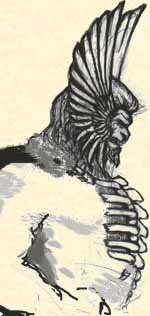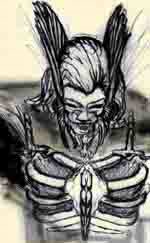I saw something soul-stunning. I and several other medical students had the opportunity to measure blood pressures and glucoses at Carpenter's Church - a church/organization that apparently serves the homeless and the down-on-your-luck crowd - good people in a bad way. I felt so at home, as I knew I would, partly because this was the kind of people I felt privileged to work with all those years ago through a charity in the Fourth Ward of inner-city Houston - a life-changing zenith in my right-outta-high-school life.
Maybe it's the struggle that makes them so kind and fiercely honest. Or maybe it's that their faults have been dragged so far into the open (drug addictions, homelessness, abuse, violence, etc.) that, unlike in my world, there's nothing hidden and what you see is refreshingly what you get. Or maybe it's the safe haven of organizations like Carpenter's that gives them respite - I don't know. But I do know that I find myself inspired because I feel like I am among giants of virtue - were I in their situations (never mind how they got there) I'm not sure I would fare nearly so well. So I'm used to being amazed and surprised in this environment.
Usually, Tuesday evening is a time that the Carpenter's congregants gather together for a meal and fellowship. I was surprised to find out that for the month of October, Carpenter's clientele are fasting Tuesday evenings. Yes, they've chosen not to eat. They decided to give their meal funds to charities. You read that right. Homeless people, recovering drug addicts, and other giants of virtue were giving. Even now, as I type, I have to pause to absorb the significance of what I saw.
An executive from the South Plains Food Bank came to talk to them; however, unlike what one might expect, she didn't come to see what kind of food these people needed. No. The lady from the South Plains Food Bank came to tell the giants of virtue about all the needy children that SPFB feeds and all the families that depend on donations to the SPFB.
She was asking these homeless giants of virtue to GIVE. You read that right. Imagine watching this unfold before your eyes in a large warehouse-type room where about thirty very poor people at various stages of recovery and struggle listening to well-dressed SPFB executive (volunteer by the way) tell them how they could help a child avoid extreme hunger. It was living poetry. Take a moment before you read the next sentence ...
... because they passed the hat. The unwealthy homeless giants of virtue dug down deep, some into their dirty pockets and some into their plastic purses. It wasn't much, to be sure, but they gave enormously. I gave too - a pittance comparatively - because there was no way I could look that SPFB little girl in the eye and explain how near-penniless homeless people found a way to feed her but I didn't.
They didn't donate just to the South Plains Food Bank. Once again, "the poor" gave to me. I left Carpenter's Church gratefully ashamed and thoroughly inspired and hopeful. For all the atrocities and stupidities whirling about us, we live in a marvelous place and time in our human history - and among Giants of Virtue! Lord have mercy.
+Joseph Bishara
Sunday, October 17, 2010
Tuesday, May 18, 2010
A Meditation on Wounds
Some Wounds Heal Best Opened - by Joseph Bishara
--------------------------------------
Some wounds heal best opened
So their poisons melt in the sun
And their deep evils die in the open air
Until the cleaning's all done.
Clean wounds are closed and mended
Never to be opened again
For once the healing is ended
The hole is made whole once again.
I wrote this as I was thinking about bacteria in a puncture wound (e.g. an animal bite). I wonder if, by analogy, this poem holds true for psychological wounds as well.
Monday, April 26, 2010
Body Donor Poem
A Tribute To Chu-La
-------------------------
Have you ever seen a broken vessel,
Sunk into a shallow sea?
Is brine and bone
and all alone
what we're destined for eventually?
But it's captain stands right beside me.
She wanted me to see
The ship she chartered
before she parted
from her blessed lifelong journey.
Her broken mast and hull -
less frightening when she stood with me.
She showed me the ropes
and offered her hopes
I would help other captains at sea.
My poem honors the woman who gave her body so I and other medical students could study anatomy. I know very little about her other than, in life, she was employed in church administration. I called her "Chu-La" - short for Church Lady - because "chula" means "cute" in Spanish, and I thought she might have smiled at that. May God rest her soul - and mine too when my time comes. +Joseph Bishara
-------------------------
Have you ever seen a broken vessel,
Sunk into a shallow sea?
Is brine and bone
and all alone
what we're destined for eventually?
But it's captain stands right beside me.
She wanted me to see
The ship she chartered
before she parted
from her blessed lifelong journey.
Her broken mast and hull -
less frightening when she stood with me.
She showed me the ropes
and offered her hopes
I would help other captains at sea.
My poem honors the woman who gave her body so I and other medical students could study anatomy. I know very little about her other than, in life, she was employed in church administration. I called her "Chu-La" - short for Church Lady - because "chula" means "cute" in Spanish, and I thought she might have smiled at that. May God rest her soul - and mine too when my time comes. +Joseph Bishara
Monday, February 1, 2010
Homeless sapiens
Homeless sapiens
We wouldn’t have been able to enter St. John’s United Methodist Church at 6:30 pm that Monday, were it not for the playful six-year-old boy who came barreling down the hall to let us in before disappearing as quickly as he came. Harry (let’s call him), the church volunteer – a thin, pleasant, 81-years-young, church volunteer – and his wife weren’t told we’d be coming. They were less than excited to see us as they were in the midst of cleaning up after dinner for three families their church was hosting. Harry said all three of the families were single-mother and wouldn’t it be better if we came back later when kids – the little heathens, I mean angels (wink, wink) – were in daycare and a mother could give us a proper interview.
As Harry took us on a tour of the place he told us more about Family Promise. Family Promise asks churches in the community to house a few homeless families (no more than fourteen people) for one week every few months. These families are moved from church to church each week and have 90 days to resolve their circumstances to find homes. Additionally, each church community is responsible for feeding these families breakfast and dinner. Between 7:30am and 5:30pm the families are out on their own, kids in daycare, and parents trying to find work and housing. According to a report for the Tarrant County Commissioner’s office, nearly one third of Fort Worth’s homeless population in 2007 were children, but in this microcosm, children were two thirds.
As we walked I got more and more uncomfortable that no one told these women that we’d be here. There we were, walking around in their 'homes', hoping to catch a glimpse of one, like tourists in a wildlife homeless refuge, or worse, a homeless petting zoo. Demeaning, to be sure, but it seems that is one of the difficulties of being homeless – it seems part of being homeless is to feel less than human, and when we come to ‘look’, there’s a realization in their gazes coming back, “why are they intruding on me? … oh yeah, I’m no longer of the human species … I’m a Homeless sapiens.”
The building’s wing had two stories. The first floor was a corridor of meeting rooms and a sizeable kitchen and eating area. Having finished eating, all the young children, none older than eight by my estimation, were running around happily and noisily up and down the hall. The upper floor had small classrooms, which would double as bedrooms this week for the families, and a commons room with a big television, sofas, and a few small tables and chairs for board games – much like a big living room. Two mothers were on couches watching the television as their children ran around the room. The big plasma television had images of beautiful, wealthy people furrowing their brows at each other in exotic settings – the bikini beach, the bikini pool, ooh there’s a diva slap, and a cop trying to solve a crime from his $100k sports car – a drama commercial so out of touch. I sit for a while on the couch watching absurd television and finally, (call her) Belinda, a 38 year old latina mother of speaks to me. She’s already talked to someone at the center and she’s tired of giving interviews. I tell her it’s no problem and she doesn’t have to tell me anything. I think she saw that Brittany and Alyssa were playing with her daughters so well that she decided to open up.
She was born in Mississippi but moved to the Lubbock area shortly thereafter and grew up here. She went to Wilson High School, married young and then moved to the Dallas area. She divorced her husband there and started and ran a successful retail shop for a few years. She had her two daughters (call them Marina - 6, and Chloe - 4) by a man she is no longer with. She moved back to the Lubbock area after some financial setbacks brought about by health issues her children were having. Marina has a severe peanut allergy and Chloe has had one near-fatal asthma attack. Those two emergency room visits put Belinda into tens of thousands of dollars in healthcare debt. Both the National Coalition for the Homeless and the Tarrant County Commissioner’s report cite studies showing a high correlation of poor health with homelessness, with the former going so far as to say, “… a serious illness or disability can start a downward spiral into homelessness…”. Belinda also faced business challenges with her dress shop so after the breakup with her daughters' father, she decided to move back to the Lubbock area to be around family. She brought a sizeable inventory to start a new dress shop here and kept it going for about a year. She has had a job with Body Works that she says didn't pay well and she started struggling with bills and now has her own health problems - she is diabetic and the stress of her situation started to affect her health - tremors and facial ticks. She can't afford to put her youngest in daycare and anticipates more free time once her youngest daughter can attend school. She would like to continue her dress shop but needs more capital to start. She has family in the area which she says is in worse shape financially than she is, so she hasn't approached them for help - with the exception of her father. Her father, widowed a few years ago when her mother died, has since remarried and her father's new wife doesn't want Belinda around. Anyway, all her family is south of town but her car doesn't work very well. While Belinda seems appreciative and grateful for Family Promise, she also explained the difficulty of that situation. She has to be out by 7 am and pack up everything she and her two daughters will need for the rest of the day until evening. She lives out of suitcases and has to be prepared to move to a different location every week.
My goal was to have a proper conversation with one of “them”, and I certainly did. “The Homeless” is not an abstract idea for me now. It’s someone as old as me, with as many children to care for as me, with more business success than me struggling to give her children stability. I expected to be humbled by what I saw. I myself was homeless for a couple of months in college, living out of my car and making due. However that was for a finite amount of time which I knew would end when the dorms were reopened for the fall semester and I certainly didn’t have two children in tow. According to Tarrant County’s report, about half of all homeless people have mental illness, or substance abuse, or both, so I know that some of these families are struggling in ways beyond what is showing. Still, I was so impressed with Belinda. She wasn’t looking for a way to leech off of a charity and she didn’t blame anyone for her situation. Her children’s uninsured medical needs had disastrous consequences, but she certainly didn’t blame her daughters. Unfortunately for Belinda and her little girls, homelessness can exacerbate existing health issues and add illnesses. I’m not sure Belinda knows how she would change the health care, except to say a peanut allergy or asthma and no health insurance has been debilitating.
In the end Harry actually had fun playing board games with the little girls, I am persuaded because of the attention Alyssa and Brittany showered on “the little heathens, I mean angels” (and also because he wasn’t as stretched-thin as he would have been without us there, maybe). He was so impressed with Alyssa, Brittany, and I that he wanted us to keep in touch and tell him how our medical training was going. It was clear to me that the whole experience reminded all of us – all of us including Belinda – that Homeless sapiens are human beings.
We wouldn’t have been able to enter St. John’s United Methodist Church at 6:30 pm that Monday, were it not for the playful six-year-old boy who came barreling down the hall to let us in before disappearing as quickly as he came. Harry (let’s call him), the church volunteer – a thin, pleasant, 81-years-young, church volunteer – and his wife weren’t told we’d be coming. They were less than excited to see us as they were in the midst of cleaning up after dinner for three families their church was hosting. Harry said all three of the families were single-mother and wouldn’t it be better if we came back later when kids – the little heathens, I mean angels (wink, wink) – were in daycare and a mother could give us a proper interview.
As Harry took us on a tour of the place he told us more about Family Promise. Family Promise asks churches in the community to house a few homeless families (no more than fourteen people) for one week every few months. These families are moved from church to church each week and have 90 days to resolve their circumstances to find homes. Additionally, each church community is responsible for feeding these families breakfast and dinner. Between 7:30am and 5:30pm the families are out on their own, kids in daycare, and parents trying to find work and housing. According to a report for the Tarrant County Commissioner’s office, nearly one third of Fort Worth’s homeless population in 2007 were children, but in this microcosm, children were two thirds.
As we walked I got more and more uncomfortable that no one told these women that we’d be here. There we were, walking around in their 'homes', hoping to catch a glimpse of one, like tourists in a wildlife homeless refuge, or worse, a homeless petting zoo. Demeaning, to be sure, but it seems that is one of the difficulties of being homeless – it seems part of being homeless is to feel less than human, and when we come to ‘look’, there’s a realization in their gazes coming back, “why are they intruding on me? … oh yeah, I’m no longer of the human species … I’m a Homeless sapiens.”
The building’s wing had two stories. The first floor was a corridor of meeting rooms and a sizeable kitchen and eating area. Having finished eating, all the young children, none older than eight by my estimation, were running around happily and noisily up and down the hall. The upper floor had small classrooms, which would double as bedrooms this week for the families, and a commons room with a big television, sofas, and a few small tables and chairs for board games – much like a big living room. Two mothers were on couches watching the television as their children ran around the room. The big plasma television had images of beautiful, wealthy people furrowing their brows at each other in exotic settings – the bikini beach, the bikini pool, ooh there’s a diva slap, and a cop trying to solve a crime from his $100k sports car – a drama commercial so out of touch. I sit for a while on the couch watching absurd television and finally, (call her) Belinda, a 38 year old latina mother of speaks to me. She’s already talked to someone at the center and she’s tired of giving interviews. I tell her it’s no problem and she doesn’t have to tell me anything. I think she saw that Brittany and Alyssa were playing with her daughters so well that she decided to open up.
She was born in Mississippi but moved to the Lubbock area shortly thereafter and grew up here. She went to Wilson High School, married young and then moved to the Dallas area. She divorced her husband there and started and ran a successful retail shop for a few years. She had her two daughters (call them Marina - 6, and Chloe - 4) by a man she is no longer with. She moved back to the Lubbock area after some financial setbacks brought about by health issues her children were having. Marina has a severe peanut allergy and Chloe has had one near-fatal asthma attack. Those two emergency room visits put Belinda into tens of thousands of dollars in healthcare debt. Both the National Coalition for the Homeless and the Tarrant County Commissioner’s report cite studies showing a high correlation of poor health with homelessness, with the former going so far as to say, “… a serious illness or disability can start a downward spiral into homelessness…”. Belinda also faced business challenges with her dress shop so after the breakup with her daughters' father, she decided to move back to the Lubbock area to be around family. She brought a sizeable inventory to start a new dress shop here and kept it going for about a year. She has had a job with Body Works that she says didn't pay well and she started struggling with bills and now has her own health problems - she is diabetic and the stress of her situation started to affect her health - tremors and facial ticks. She can't afford to put her youngest in daycare and anticipates more free time once her youngest daughter can attend school. She would like to continue her dress shop but needs more capital to start. She has family in the area which she says is in worse shape financially than she is, so she hasn't approached them for help - with the exception of her father. Her father, widowed a few years ago when her mother died, has since remarried and her father's new wife doesn't want Belinda around. Anyway, all her family is south of town but her car doesn't work very well. While Belinda seems appreciative and grateful for Family Promise, she also explained the difficulty of that situation. She has to be out by 7 am and pack up everything she and her two daughters will need for the rest of the day until evening. She lives out of suitcases and has to be prepared to move to a different location every week.
My goal was to have a proper conversation with one of “them”, and I certainly did. “The Homeless” is not an abstract idea for me now. It’s someone as old as me, with as many children to care for as me, with more business success than me struggling to give her children stability. I expected to be humbled by what I saw. I myself was homeless for a couple of months in college, living out of my car and making due. However that was for a finite amount of time which I knew would end when the dorms were reopened for the fall semester and I certainly didn’t have two children in tow. According to Tarrant County’s report, about half of all homeless people have mental illness, or substance abuse, or both, so I know that some of these families are struggling in ways beyond what is showing. Still, I was so impressed with Belinda. She wasn’t looking for a way to leech off of a charity and she didn’t blame anyone for her situation. Her children’s uninsured medical needs had disastrous consequences, but she certainly didn’t blame her daughters. Unfortunately for Belinda and her little girls, homelessness can exacerbate existing health issues and add illnesses. I’m not sure Belinda knows how she would change the health care, except to say a peanut allergy or asthma and no health insurance has been debilitating.
In the end Harry actually had fun playing board games with the little girls, I am persuaded because of the attention Alyssa and Brittany showered on “the little heathens, I mean angels” (and also because he wasn’t as stretched-thin as he would have been without us there, maybe). He was so impressed with Alyssa, Brittany, and I that he wanted us to keep in touch and tell him how our medical training was going. It was clear to me that the whole experience reminded all of us – all of us including Belinda – that Homeless sapiens are human beings.
Subscribe to:
Comments (Atom)






